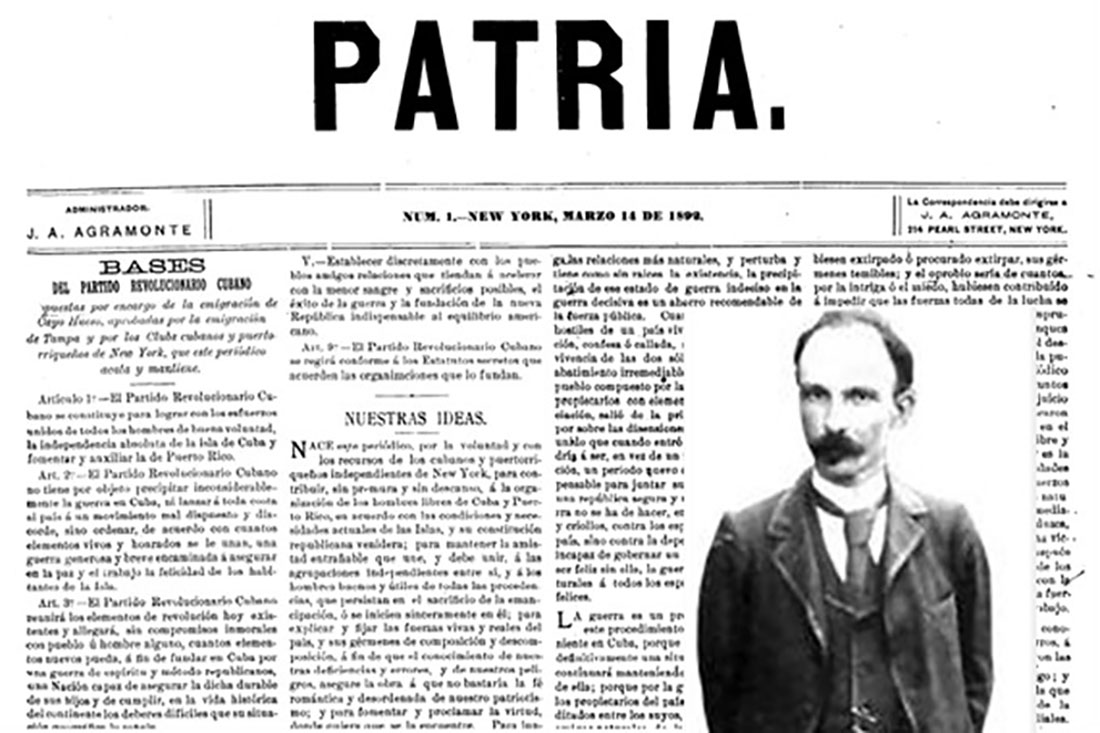On March 14th, 1892, the journalistic publication turned into the indispensable spokesperson in favor of the independence of Cuba, the Patria newspaper, would be born in New York. Its initiator could not be other than our apostle José Martí. The publication born a few days before the founding of the Cuban Revolutionary Party on April 10th, 1892, of which it would be its official publication.
Martí’s journalistic work was extensive enough to assume the tasks of direction, proofreading, and writing various articles for the newspaper. He had collaborated with La Revista Universal de México, directed La Revista Venezolana, and from New York was a correspondent for La Opinion Nacional de Caracas. He drafted the Constant Section. He published some one hundred and twelve notes on trivia, history, letters, science, and biography under the pseudonym “M. of Z”.
Homeland for Martí
Although the Cuban Revolutionary Party (PRC, by its acronym in Spanish) was the great political work of Martí that achieved the necessary unity of Cubans in favor of independence, Patria was the culmination of his journalistic work, to which he would dedicate himself with greater commitment from its pages than ever before and where he carried out an extraordinary work of revolutionary propaganda. Patria arises from the will and with the resources of all known Cuban and Puerto Rican revolutionaries in New York, as his closest collaborators a Puerto Rican, Sotero Figueroa, and a Cuban, Gonzalo de Quesada y Aróstegui, who also alternate in the direction of the newspaper in his absence.
In the work team of the new newspaper were Benjamín Guerra, Abelardo Agramonte, Rafael Serra, Antonio Vélez Alvarado and Francisco González Marín, among others, and in its pages were sections such as The Political Situation, Heroes, War, Revolutionary Primer, The News, Grained Fire, Punctures and Notes of the Colony. The Bases of the Cuban Revolutionary Party, information on the revolutionary clubs, patriotic and recreational activities and other topics of interest were also published there. Martí reserves himself for Patria, he writes only in its pages, and tries that the newspaper achieves the quality of essential content to guide, organize and unite an entire people in exile in order to achieve the independence of the beloved Motherland.
Its organization
Until October 1895 Patria had a weekly frequency and from October 5th, 1995 until its last edition it was published twice a week, on Wednesdays and Saturdays. The print run amounted to just over 1,500 copies and was published at 120 Front Street in New York. The last edition of the newspaper was on December 31st, 1898 in New York.
After Martí, Enrique José Varona (10/23/1895 – 1897) assumed the leadership of Patria, later Eduardo Yero Buduén from Santiago (8/25/1897 – 9/28/1898) and finally Nicolás Heredia (December/1898). ). The editors were always closely linked with the directors, given that many times one of them fulfilled merely political or military missions, while the other carried on the newspaper.
His goal, his legacy
José Martí left us important lessons as an inheritance, from which we corroborate that journalism is art, it is felt from deep within and runs through the veins. Journalism is not an obligation, it is passion. Journalism is not writing gushes of ideas or pretty words, it is deep creation, spirituality, commitment to the truth, it is exclusivity seen from the soul, but stripped of all human mediocrity.
It was stated in the editorial that began and served as ideological identification for Patria: “This newspaper was born, by the will and with the resources of the independent Cubans and Puerto Ricans of New York, to contribute, without haste and without rest, to the organization of the freemen from Cuba and Puerto Rico, in accordance with the current conditions and needs of the Islands, and their coming republican constitution; to maintain the intimate friendship that unites, and must unite, the independent groups among themselves and the good and useful men of all origins who persist in the sacrifice of emancipation, or are sincerely initiated in it, to explain and fix the forces alive and real of the country and its germs of composition and decomposition, so that the knowledge of our deficiencies and errors and of our dangers, assures the work to which the romantic and disorderly faith of our patriotism would not suffice, and to promote and proclaim Virtue wherever it is found. To gather and love”.
Translated by: Aileen Álvarez García






